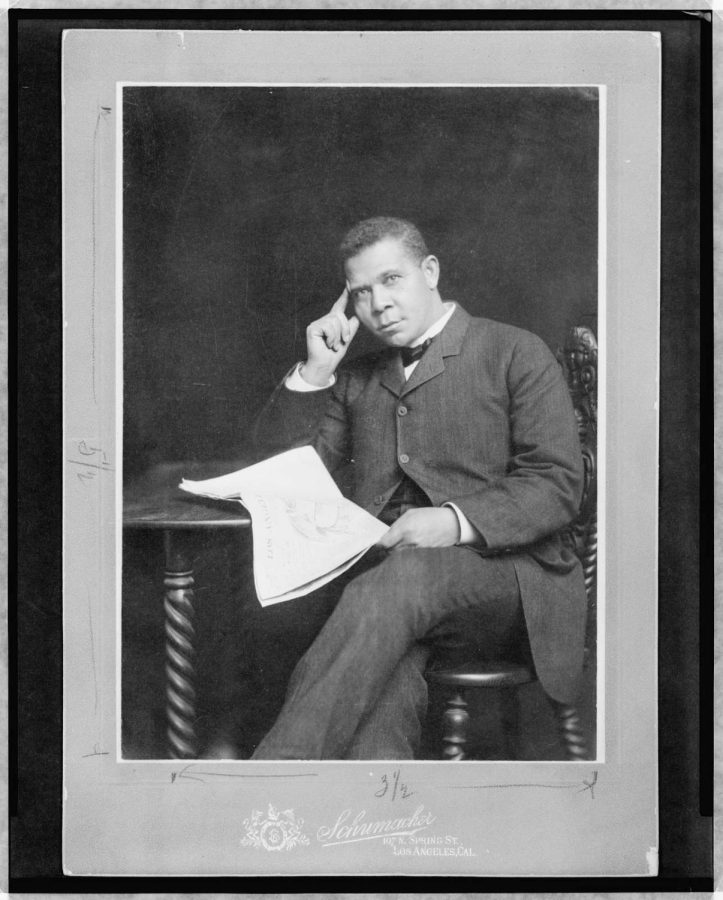Booker T. Washington and “Up from Slavery”
“Booker T. Washington” is one of those names we remember hearing in American History, but most of us couldn’t say why. So who was Booker T. Washington, and why does he continue to be important today?
Booker Taliaferro Washington was born a slave in Franklin County, Virginia in 1856. He was freed at the conclusion of the American Civil War at age nine, though living in poverty. At age sixteen, with a hunger for learning, he sought an education at the Hampton Normal and Agricultural Institute, a primarily black school focused on moral training and a practical education. Washington worked as a janitor to get himself through school, always meticulous and thorough. He later taught at the Hampton Institute. In 1881, Washington helped to found the Tuskegee Institute, which stressed self-improvement, thrift, hard work, and vocational training – practical education – alongside book learning. While never easy, the Institute would grow to educate thousands of students over the course of Washington’s life, and would produce the country’s finest in certain vocations. Washington advocated for interracial cooperation and the education and civil rights of blacks throughout his life, becoming a respected orator and writer.1
Washington’s ideologies are somewhat controversial; he was criticized by W.E.B. DuBois, a contemporary in civil rights activism, for encouraging whites to work in tandem to advance blacks while they worked to advance their own situations – a philosophy known as the Atlanta Compromise.2 DuBois wrote that, “Mr. Washington represents in Negro thought the old attitude of adjustment and submission.…[His] programme practically accepts the alleged inferiority of the Negro races.”3 Having read and studied Washington’s ideologies, I disagree with DuBois. While some may take DuBois’s interpretation, I’ve found Washington to be a champion of the common man working for improvement, not consigned to live in inferiority.
Washington believed that education was the way to opportunities for blacks in the post-emancipation United States. He wrote, “I had the strong feeling that what our people needed most was to get a foundation in education, industry, and propriety… depending on the slow but sure influences that proceed from the possession of property, intelligence, and high character for the full recognition of his political rights.” This idea, that self-improvement was the key to civil rights, guided his work at the Institute. The Tuskegee Institute had a heavy emphasis on unorthodox things, like personal hygiene, and vocations like agriculture, brick-making, and domestic duties – not just the Greeks and Latins of “book learning”.4
Washington’s incredible work ethic penetrated his actions throughout his life. He wrote, “(There was then) a rather prevalent idea among our people that to secure an education meant to have a good, easy time, free from all necessity of manual labor…. I… learned to love labour, not alone for its financial value, but for labour’s own sake and for the independence and self-reliance which the ability to do something which the world wants done brings.”5 This, too, was reflected in his advocacy and in his work with the Tuskegee Institute.
I think there’s something really powerful about going to original sources to learn about what someone thought; a Wikipedia article is never going to be as accurate as someone’s own words, and solely relying on summaries can lead to some unfounded misperceptions. Booker T. Washington became a relatively prolific author and orator. His autobiography, “Up from Slavery” tells his story – his humble beginnings, craving for self-improvement, and dedicated work on the behalf of blacks. It’s an inspiring story.
Hannah Sorensen, a local homeschooled senior who has studied “Up from Slavery”, said, “I was most inspired by (Booker T. Washington’s) determination to do things right. He never left a job undone, but instead worked his hardest to do the best he could. All through his life, Washington not only rose up from slavery but set an example for the rest of us of what hard work and determination can do to lead us to ultimate success.”6
_____________________
1 The Editors of Encyclopaedia Britannica. (2022, November 10). Booker T. Washington | Biography, Books, Facts, & Accomplishments. Encyclopedia Britannica
2The Editors of Encyclopaedia Britannica. (1998, July 20). Atlanta Compromise | History & Analysis. Encyclopedia Britannica
3 DuBois, W. E. B. (1903). The Souls of Black Folk
4 Washington, B. T. (1901). Up From Slavery: Autobiography
5 Washington, B. T. (1901). Up From Slavery: Autobiography
6 Sorensen, Hannah. Thoughts on Booker T. Washington. 5 Dec. 2022.






